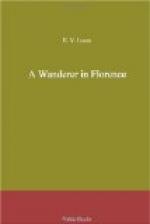Florence is so intimately associated with Landor, and Landor was so happy in Florence, that a brief outline of his life seems to be imperative. Born in 1775, the heir to considerable estates, the boy soon developed that whirlwind headstrong impatience which was to make him as notorious as his exquisite genius has made him famous. He was sent to Rugby, but disapproving of the headmaster’s judgment of his Latin verses, he produced such a lampoon upon him, also in Latin, as made removal or expulsion a necessity. At Oxford his Latin and Greek verses were still his delight, but he took also to politics, was called a mad Jacobin, and, in order to prove his sanity and show his disapproval of a person obnoxious to him, fired a gun at his shutters and was sent down for a year. He never returned. After a period of strained relations with his father and hot repudiations of all the plans for his future which were made for him—such as entering the militia, reading law, and so forth—he retired to Wales on a small allowance and wrote “Gebir” which came out in 1798, when its author was twenty-three. In 1808 Landor threw in his lot with the Spaniards against the French, saw some fighting and opened his purse for the victims of the war; but the usual personal quarrel intervened. Returning to England he bought Llanthony Abbey, stocked it with Spanish sheep, planted extensively, and was to be the squire of squires; and at the same time seeing a pretty penniless girl at a ball in Bath, he made a bet he would marry her, and won it. As a squire he became quickly involved with neighbours (an inevitable proceeding with him) and also with a Bishop concerning the restoration of the church. Lawsuits followed, and such expenses and vexations occurred that Landor decided to leave England—always a popular resource with his kind. His mother took over the estate and allowed him an income upon which he travelled from place to place for a few years, quarrelling with his wife and making it up, writing Latin verses everywhere and on everything, and coming into collision not only with individuals but with municipalities.
He settled in Florence in 1821, finding rooms in the Palazzo Medici, or, rather, Riccardi. There he remained for five years, which no doubt would have been a longer period had he not accused his landlord, the Marquis, who was then the head of the family, of seducing away his coachman. Landor wrote stating the charge; the Marquis, calling in reply, entered the room with his hat on, and Landor first knocked it off and then gave notice. It was at the Palazzo Medici that Landor was visited by Hazlitt in 1825, and here also he began the “Imaginary Conversations,” his best-known work, although it is of course such brief and faultless lyrics as “Rose Aylmer” and “To Ianthe” that have given him his widest public.
On leaving the Palazzo, Landor acquired the Villa Gherardesca, on the hill-side below Fiesole, and a very beautiful little estate in which the stream Affrico rises.




